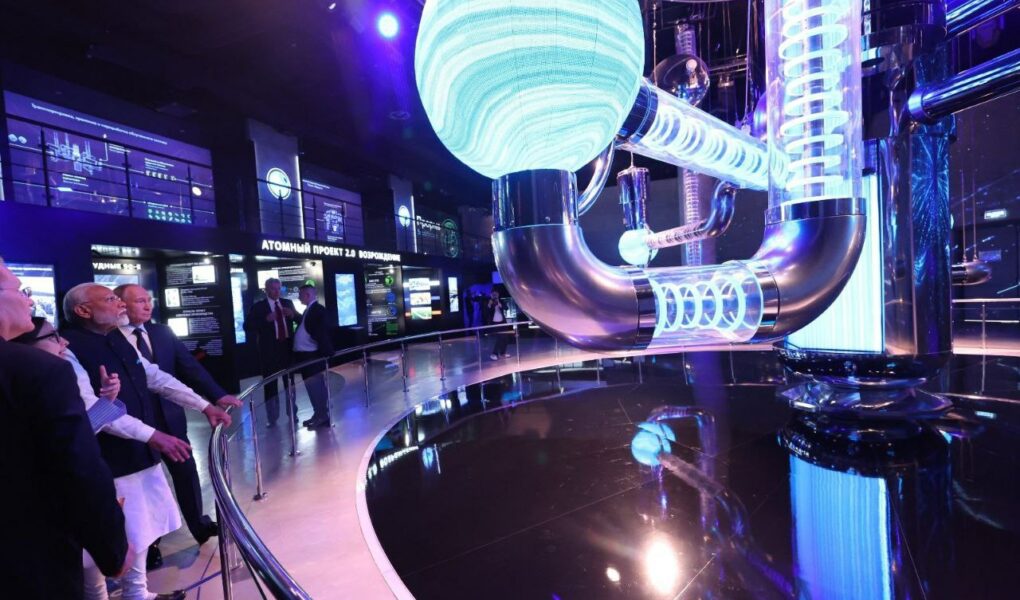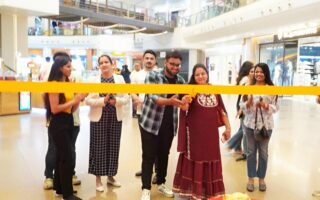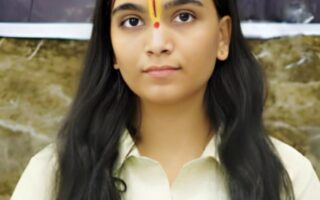Friendly relations between Russia and India began with trade ties, continued with cultural ties, and are being strengthened today through multifaceted cooperation. Every visitor from Bharat will feel just how much the Indian culture inspires warmth, respect, and fascination when they’re in Moscow—India’s Prime Minister Narendra Modi experienced this firsthand in July 2024. Let’s follow his routes in Moscow and discover the locations in the Russian capital that keep the two countries connected.
Narendra Modi at Рavilion “Atom”, VDNKH – photo provided by the Embassy of India in Moscow
The Impressive VDNKh – Something Not to Be Missed in Moscow
Apart from the Kremlin grounds, where the official talks took place, Indian Prime Minister Narendra Modi and Russian President Vladimir Putin visited the VDNKh, Moscow’s largest exhibition complex. This historic site of the Soviet Exhibition of National Economic Achievements is now a popular destination for Russian and foreign tourists. The pavilion “Cosmos” with original exhibits and models, game zones, and an imitation of the spacecraft control center is especially popular. VDNKh houses one of the largest aquariums in Moscow, “City Farm”—a country life haven in the middle of the metropolis, a realistic model of Moscow on a scale of 1:400, and the ride “The Sun of Moscow”—a Ferris wheel 140 meters high. The Indian Prime Minister was particularly impressed by the Atom pavilion dedicated to the history of nuclear physics and nuclear energy technologies. “The exhibition is a stunning demonstration of the role of nuclear technology in promoting progress, prosperity, and energy security for people. I am confident that the exhibition will inspire many young minds to delve deeper into the realm of nuclear energy and technology for the benefit of future generations and our planet,” was the feedback Modi left in the book for guests of honor.

VDNKH, The Friendship of Peoples Fountain
Red Square and the Diamond Treasury of the Kremlin
The heart of Russia—the Red Square—is a strikingly beautiful landmark that attracts all tourists. When taking a photo here, remember that in 1982, the first Indian astronaut Rakesh Sharma, who went into orbit from Baikonur as part of the Soviet crew, was photographed here as well, against the brick walls of the Kremlin.

The members of the Soviet-Indian crew of the Soyuz T-11 spacecraft, Georgy Grechko, Rakesh Sharma, Gennady Strekalov, Yuri Malyshev, Ravish Malhotra, Anatoliy Berezovoy near the Red Square, 1984 – photo provided by the Russian State Archive of Scientific and Technical Documentation
Several world-famous jewels of Indian origin can be seen in the Red Square. They’re located in the treasury of Russian monarchs—the Diamond Fund of the Kremlin. One of the most famous stones of the Diamond Fund is the precious Orlov diamond discovered in India. In its original form, the stone weighed 787 carats, and according to legend, it adorned the eye of the statue of the Indian deity Brahma. History eventually brought this stone to Imperial Russia, where it was presented to Catherine II by Count Orlov and inlaid in the imperial scepter.
Monuments to Great Indian Figures on the Streets of Moscow
Ever since the Tver merchant Afanasy Nikitin visited India in the 15th century and described this exotic wondrous country in his book “A Journey Beyond the Three Seas,” Russia and India have been building strong friendly relations. Since the 1950s, the USSR has supported India politically and economically, and today Russia continues this course. In modern Moscow, the memory of close ties between the countries is preserved in the sculptures of great Indian figures, faithfully cared for over the years.
There are several sculptures dedicated to the great Indian political and public figure Mahatma Gandhi in Moscow. One of them stands at the intersection of Michurinsky and Lomonosovsky avenues in the southwest of the capital. It is a copy of the Indian monument created from an actual photograph of Gandhi. In it, he is depicted on his symbolic march to the ocean shore, wearing his iconic glasses and holding a staff, dressed in simple garments. Another sculpture, after restoration, is located on the territory of the Muzeon Art Park (Oktyabrskaya metro station). It mirrors the image kept in the Mahatma Gandhi Memorial Museum in Delhi. Another monument was created specifically for the Indian Embassy and is located on its grounds. The pedestal bears the quote of the great Gandhi: “My life is my message.”

Mahatma Gandhi monument – photo provided by the Embassy of India in Moscow
In the park of the Great Moscow Circus near the metro station “University,” there is a monument to another important Indian figure—the first Prime Minister Jawaharlal Nehru, under whom the relations between Russia (at that time, the USSR) and India were significantly strengthened.

Jawaharlal Nehru monument- photo provided by the public sources
The monument to Nehru’s daughter, the politician Indira Gandhi, was opened in Moscow personally by the head of state Mikhail Gorbachev together with Rajiv Gandhi in 1987, at the Indira Gandhi Square at the intersection of Lomonosovsky and Michurinsky avenues. At that time, in the wake of strong friendship with India, many Soviet girls were named after Indira Gandhi, and this elegant monument still reminds of the “Great Daughter of the Great Nation,” as Indira Gandhi was called in the USSR.
Another sculpture was a gift to Moscow from the Indian government—a monument to the poet Rabindranath Tagore. It is installed in the “Friendship Park” near Moscow’s Northern River Station, a popular vacation spot for Muscovites.

Rabindranat Tagore monument – photo provided by the public sources
Indian Embassy Building in an Old Moscow Mansion
The Embassy of India in Moscow and the residence of the Ambassador of India (Vorontsovo Pole, 6-8) are located in a unique old mansion—the House of Talking Snakes in the Art Nouveau style. Over epochs this mansion complex belonged to various famous and influential people of Moscow: princes, patrons of art, and merchants. It is a secluded place shrouded in greenery, with all its architectural treasures preserved: vases coiled with stone snakes, a Moorish fireplace, a unique ceiling lantern in the former library room. Twice a year, on Days of Historical and Cultural Heritage (April 18 and May 18), the Embassy buildings in Moscow are open to the public. For those who did not manage to get inside this historic mansion on these dates, the Department of Cultural Heritage of the city recorded a special video tour with a professional guide.
The Jawaharlal Nehru Cultural Center works under the Embassy of India and employs specialists from India who teach Russians the Hindi language, classical dance “Kathak,” yoga, and tabla playing, conduct classes in Bharatanatyam, Kuchipudi, Mohiniattam, Odissi, Indian folk dances, as well as classes in the martial art of Kalaripayattu.
Art of India at the Oriental Museum
The huge permanent exposition of the Museum of Oriental Art (12A Nikitsky Boulevard) with more than three thousand items is dedicated to the art of India. A unique collection of textiles, wood and metal artifacts, lacquers, carved bone, and weapons allow the residents of Russia an insight into the ancient culture of India. Among the showpieces there are chest-cabinets made in the unique bidri technique and large vessels decorated with silver chasing, weightless Kashmiri shawls of exquisite craftsmanship. One of the most fascinating and authentic showpieces of the museum is the altar of goddess Durga for the Durga-puja festival, made of carved reed shola.
Moscow is the City of Fate of Hazrat Inayat Khan
An entire chapter in the life of the Indian musician Hazrat Inayat Khan is connected to Moscow. One of the most prominent representatives and followers of the spiritual tradition of the eastern school of Sufism came to pre-revolutionary Moscow during his long journey, and stayed here for a long time. Together with his brothers, he entered the Moscow musical circle, became friends with teachers of the Imperial Conservatory, singers, composers, and poets of that time. Inayat Khan performed at the Moscow Conservatory (13/6 Bolshaya Nikitskaya Street), and as part of ethnographic concerts at the Polytechnic Museum (historical building on Novaya Square, 3/4)—one of the most prominent hubs of cultural life in Moscow.
Center of Indian Culture – Recreating Indian Traditions in Moscow
With the support of the Embassy of the Republic of India in Russia and in close cooperation with representatives of the national Indian community, the Center of Indian Culture (19A Kuusinen Street), opened by the Ambassador of India, operates in Moscow. Here you can taste traditional Indian cuisine, practice yoga and Indian dances, get advice from a Vedic astrologer, take part in ritual festivals, and listen to open lectures on Indian philosophy. The Center of Indian Culture hosts part of the events of the Moscow Festival of Indian Culture. “India Day” is the largest Indian festival in Russia, and is held annually. This year it is dedicated to the 78th anniversary of the establishment of diplomatic relations between Russia and India, and its main theme is family, as the year 2024 is called the Year of the Family in Russia. The festival in Moscow’s Dream Island Park recreated a traditional wedding ceremony and Holi color festival, an authentic Indian bazaar, showed Indian films and, of course, offered treats of Indian cuisine to the guests.
The presence of India can be felt in Moscow not only in the previously mentioned places but also in many Indian cafes and restaurants, in stores selling Indian goods, and in various events of Bharata culture and tradition. In Moscow, a large-scale Delhi Bazaar is held regularly on the square in front of Usachevsky Market (26 Usacheva St.)—an Indian market and food court of national cuisine. Traders of Indian goods gather in one place, and a number of restaurants serve traditional cuisine for several days. Muscovites already know a lot about samosas, palak paneer, and the flavor nuances of masala tea. Every year, Moscow holds an official Yoga Day, with the support of both the Indian Embassy and numerous yoga studios, which are very popular in the Russian capital. In 2024, Moscow hosted its first International Meditation Day, organized in one of the city’s parks.
The decades-long strong ties between Russia and India continue to grow to this day. Tourists from both countries can apply for electronic visas for travel, there is direct air service between Moscow and Delhi, and the number of Indian restaurants in the Russian capital allows guests from India to feel at home during tourist and business trips. India consistently ranks high in terms of the number of tourists who visit Russia, and this year, according to the data from January and February, it is one of the top five countries in terms of the number of issued electronic visas. In 2023, the tourist flow from India increased significantly: 60 thousand Indian tourists visited Moscow—a quarter more than the year before. Now, Russia and India are preparing a mutual agreement on visa-free group entry, and Moscow is working out the issue of cashless payments for foreign travelers in the country.

Celebration of the International Yoga Day in Moscow- photo provided by Rogozhina Maria

Celebration of the International Yoga Day in Moscow- photo provided by Rogozhina Maria
A friendly and generous city, Moscow welcomes guests any time of the year. Find out all about the diverse places and activities in the Russian capital on the special website Discover Moscow, plan your trip and come for an exciting experience to one of the greatest cities in the world.




